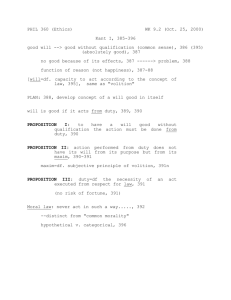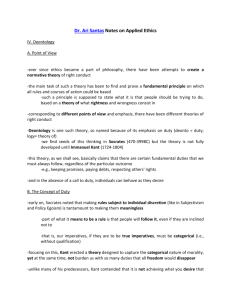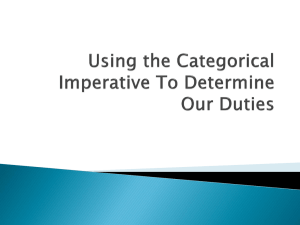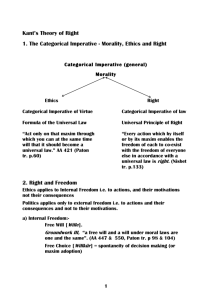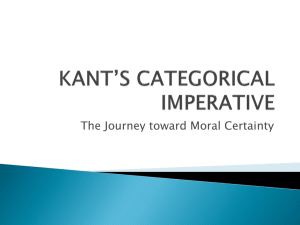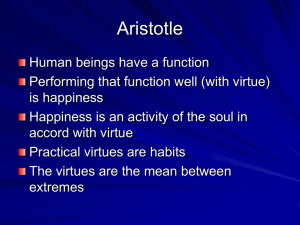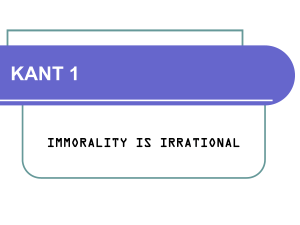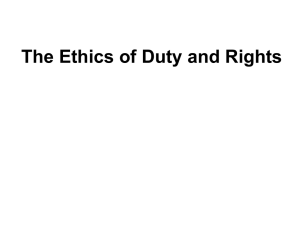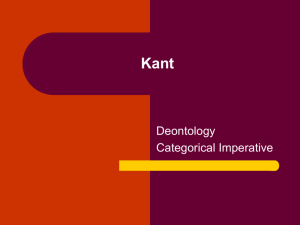24.01 Classics of Western Philosophy V. Kant Prof. Rae Langton Background.
advertisement
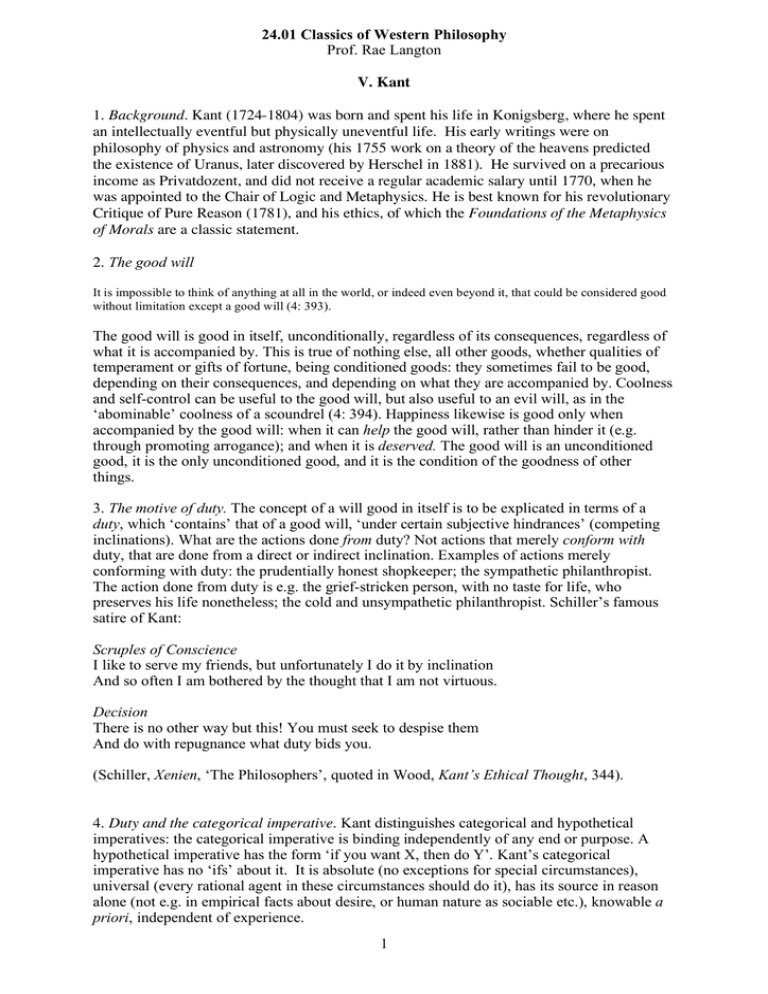
24.01 Classics of Western Philosophy Prof. Rae Langton V. Kant 1. Background. Kant (1724-1804) was born and spent his life in Konigsberg, where he spent an intellectually eventful but physically uneventful life. His early writings were on philosophy of physics and astronomy (his 1755 work on a theory of the heavens predicted the existence of Uranus, later discovered by Herschel in 1881). He survived on a precarious income as Privatdozent, and did not receive a regular academic salary until 1770, when he was appointed to the Chair of Logic and Metaphysics. He is best known for his revolutionary Critique of Pure Reason (1781), and his ethics, of which the Foundations of the Metaphysics of Morals are a classic statement. 2. The good will It is impossible to think of anything at all in the world, or indeed even beyond it, that could be considered good without limitation except a good will (4: 393). The good will is good in itself, unconditionally, regardless of its consequences, regardless of what it is accompanied by. This is true of nothing else, all other goods, whether qualities of temperament or gifts of fortune, being conditioned goods: they sometimes fail to be good, depending on their consequences, and depending on what they are accompanied by. Coolness and self-control can be useful to the good will, but also useful to an evil will, as in the ‘abominable’ coolness of a scoundrel (4: 394). Happiness likewise is good only when accompanied by the good will: when it can help the good will, rather than hinder it (e.g. through promoting arrogance); and when it is deserved. The good will is an unconditioned good, it is the only unconditioned good, and it is the condition of the goodness of other things. 3. The motive of duty. The concept of a will good in itself is to be explicated in terms of a duty, which ‘contains’ that of a good will, ‘under certain subjective hindrances’ (competing inclinations). What are the actions done from duty? Not actions that merely conform with duty, that are done from a direct or indirect inclination. Examples of actions merely conforming with duty: the prudentially honest shopkeeper; the sympathetic philanthropist. The action done from duty is e.g. the grief-stricken person, with no taste for life, who preserves his life nonetheless; the cold and unsympathetic philanthropist. Schiller’s famous satire of Kant: Scruples of Conscience I like to serve my friends, but unfortunately I do it by inclination And so often I am bothered by the thought that I am not virtuous. Decision There is no other way but this! You must seek to despise them And do with repugnance what duty bids you. (Schiller, Xenien, ‘The Philosophers’, quoted in Wood, Kant’s Ethical Thought, 344). 4. Duty and the categorical imperative. Kant distinguishes categorical and hypothetical imperatives: the categorical imperative is binding independently of any end or purpose. A hypothetical imperative has the form ‘if you want X, then do Y’. Kant’s categorical imperative has no ‘ifs’ about it. It is absolute (no exceptions for special circumstances), universal (every rational agent in these circumstances should do it), has its source in reason alone (not e.g. in empirical facts about desire, or human nature as sociable etc.), knowable a priori, independent of experience. 1 5. The Formula of Universal Law I ought never to act except in such a way that I can also will that my maxim should become a universal law...Take this question, for example. May I not, when I am hard pressed, make a promise with the intention of not keeping it? Here I readily distinguish the two senses which the question can have—is it prudent, or is it right, to make a false promise? The first no doubt can often be the case. I do indeed see that it is not enough for me to extricate myself from the present embarrassment by this subterfuge: I have to consider whether from this lie there may not subsequently accrue to me much greater inconvenience than that from which I now escape....To tell the truth for the sake of duty is something entirely different from doing so out of concern for inconvenient results...Suppose I seek, however, to learn in the quickest way and yet unerringly how to solve the problem ‘Does a lying promise accord with duty?’ I have then to ask myself ‘Should I really be content that my maxim (the maxim of getting out of difficulty by a false promise) should hold as universal law (one valid both for myself and others)? And could I really say to myself that every one may make a false promise if he finds himself in a difficulty from which he can extricate himself in no other way?’ I then become aware at once that I can indeed will to lie, but I can by no means will a universal law of lying; for by such a law there could properly be no promises at all, since it would be futile to profess a will for future action to others who could not believe my profession or who, if they did so over-hastily, would pay me back in like coin; and consequently my maxim, as soon as it was made a universal law, would be bound to annul itself. (Immanuel Kant, Groundwork of the Metaphysic of Morals, tr. Paton, ch. 1. 402, see also 421.) Kant’s illustrations: suicide, lying promise, wasting one’s talents, refusing to help others (422-3), the first two involving a contradiction in conception (there couldn’t, he says, be a law prescribing universal self-killing, or universal lying), the second two a contradiction in the will (even if there could be a law prescribing universal talent-wasting, or universal nonhelping, you couldn’t will it). 6. The Formula of Humanity Man, and in general every rational begin, exists as an end in himself, not merely as a means for arbitrary use by this or that will: he must in all his actions, whether they are directed to himself or to other rational beings, always be viewed at the same time as an end...Beings whose existence depends, not on our will, but on nature, have none the less, if they are non-rational beings, only a relative value as means and are consequently called things. Rational beings, on the other hand, are called persons because their nature already marks them out as ends in themselves—that is, as something which ought not to be used merely as a means...The practical imperative will therefore be: Act in such a way that you always treat humanity, whether in your own person or in the person of any other, never simply as a means, but always at the same time as an end. (Groundwork, 428) Kant uses the same illustrations: suicide is not treating humanity in one’s own person as an end in itself; the lying promise uses a person merely as means to an end he cannot share (theft likewise); failure to develop one’s talents, or help others, does not treat humanity as a mere means: however it fails to promote humanity as an end. 7. The Relation between the Formula of Universal Law and the Formula of Humanity. The Formula of Universal Law tells us to act in such a way that we could will everybody else to do likewise; the Formula of Humanity tells us to treat others as ends. The connection is that we are ends because, as persons, we are autonomous deliberators. To treat a person as a mere means (contrary to the Formula of Humanity) is to subvert the person’s capacity for autonomous rational deliberation. But to will that is to will such subversion in my own case (applying the Formula of Universal Law). And I cannot will that. (from Piers Benn, Ethics, 96.) 2

